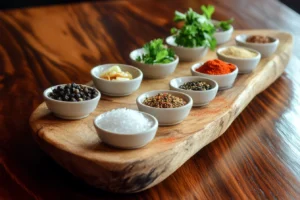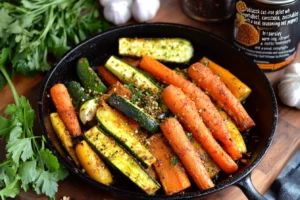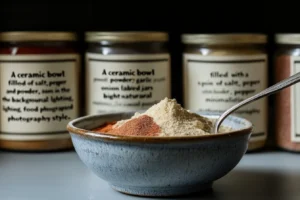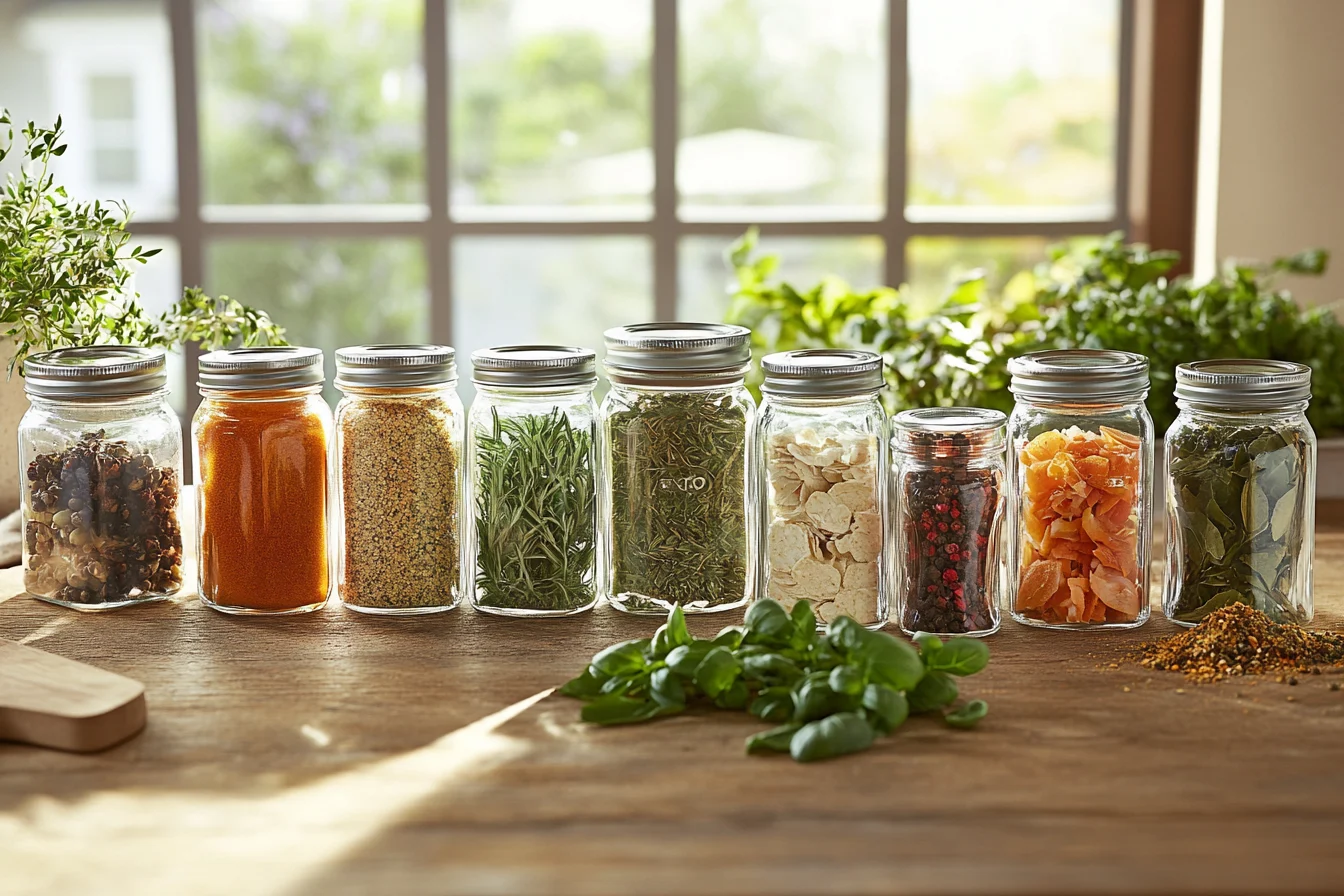ntroduction
If you’re out of all-purpose seasoning or searching for a replacement, don’t worry! There are many all-purpose seasoning substitutes that can enhance your dishes’ flavor. For instance, you can choose Italian seasoning, Cajun spice, or even a homemade mix. These substitutes are versatile, easy to use, and perfect for a variety of recipes. Moreover, creating your own all-purpose seasoning substitute allows you to adjust flavors and meet dietary preferences effortlessly.
Key Characteristics of All-Purpose Seasoning

1. Versatility
As the name implies, all-purpose seasoning works well in various dishes. For example, you can use it on meats, vegetables, soups, sauces, marinades, and more. Its adaptability makes it a must-have in many kitchens.
2. Flavor Profile
Typically, all-purpose seasoning substitutes include salt, pepper, garlic powder, onion powder, and paprika. Additionally, some blends may have parsley, thyme, oregano, or chili powder, which adds extra depth to the mix.
3. Ease of Use
Using all-purpose seasoning simplifies cooking. Instead of measuring multiple spices, this one blend saves time and adds consistent flavor to your dishes.
Why Use All-Purpose Seasoning?

The main benefit of all-purpose seasoning substitutes is their ability to enhance flavor without combining multiple spices. For example, just a pinch of these blends can elevate family dinners, barbecues, or quick snacks. Consequently, they are indispensable for busy cooks.
Cultural Variations of All-Purpose Seasoning Substitutes
Although the concept of all-purpose seasoning is universal, the ingredients often vary by region. For instance:
- Caribbean blends feature bold spices such as cumin, nutmeg, and allspice.
- Asian blends may include ginger, sesame seeds, and soy powder for unique flavors.
- Western blends often focus on classic herbs like parsley, rosemary, and black pepper.
Why Substitute All-Purpose Seasoning?
Sometimes replacing all-purpose seasoning becomes necessary. For example, you may run out, prefer a new flavor, or need more control over the ingredients in your meal.
Common Reasons for Substitution
1. Ingredient Sensitivities or Allergies
Many store-bought blends contain MSG, gluten, or high sodium, which some people need to avoid. Therefore, making a homemade all-purpose seasoning substitute ensures that it meets your dietary needs.
2. Custom Flavor Preferences
Sometimes store-bought blends don’t align with the flavor profile you want. Substituting with a DIY all-purpose seasoning substitute lets you tailor the mix to your dish perfectly.
3. Availability
If all-purpose seasoning is unavailable, using a substitute like a DIY mix or an alternative spice blend ensures your cooking continues smoothly.
4. Cost-Effectiveness
Making your own all-purpose seasoning substitute can save money, especially if you already have the required spices at home.
5. Freshness Concerns
Pre-packaged seasonings may lose their potency over time. Substituting with a freshly made mix ensures vibrant and robust flavors in your dishes.
How to Create Your Own All-Purpose Seasoning Substitute

A homemade all-purpose seasoning substitute is quick and easy to prepare. Follow this simple recipe:
- Ingredients:
- 2 tablespoons salt
- 2 tablespoons black pepper
- 1 tablespoon garlic powder
- 1 tablespoon onion powder
- 1 teaspoon paprika
- 1 teaspoon dried parsley (optional)
- Instructions:
- First, combine all the ingredients in a small bowl.
- Then, store the blend in an airtight container to keep it fresh.
- Finally, use it as a substitute for store-bought all-purpose seasoning in any recipe
2. Italian Seasoning
Italian seasoning is a mix of basil, oregano, thyme, and rosemary. It works especially well in Mediterranean dishes, like pasta, chicken, or roasted vegetables. Although it lacks salt, you can add some to balance the flavors.
3. Cajun Seasoning
Cajun seasoning is a spicy alternative. It typically includes paprika, cayenne pepper, garlic powder, and black pepper. You can use it in seafood dishes, grilled meats, or gumbo. Furthermore, it’s a great choice if you enjoy bold flavors.
4. Taco Seasoning
Taco seasoning has a smoky and spicy flavor. It contains chili powder, cumin, paprika, and oregano. You can use it in tacos, burritos, or roasted vegetables. Additionally, it gives your dish a southwestern touch.
5. Herbes de Provence
This French blend includes thyme, rosemary, oregano, and lavender. It has a light and floral taste. You can pair it with chicken, fish, or roasted potatoes. While it is less salty, its sophisticated flavor makes up for it.
6. Creole Seasoning
Creole seasoning is similar to Cajun seasoning but contains more herbs like thyme and oregano. It is both spicy and aromatic. Try it in jambalaya, shrimp, or rice dishes for a rich and flavorful meal.
7. Old Bay Seasoning
Old Bay seasoning is a classic choice for seafood. It has celery salt, paprika, and black pepper. Use it in crab cakes, roasted potatoes, or even popcorn. Not only is it versatile, but it also adds a unique twist to your recipes.
8. Curry Powder
Curry powder combines turmeric, cumin, and coriander. It has a warm and earthy flavor. You can use it in soups, stews, or roasted vegetables. Moreover, you can choose between mild and spicy varieties based on your preference.
9. Greek Seasoning
Greek seasoning includes oregano, basil, garlic, and sometimes lemon zest. It’s ideal for marinating meats or seasoning salads and vegetables. Its Mediterranean flavors make it versatile for many dishes.
10. Garam Masala
Garam masala is a blend of warm spices like cinnamon, cardamom, and cumin. It’s often used in Indian cuisine. You can add it to soups, rice dishes, or marinades to enhance their flavors.
11. Lemon Pepper
Lemon pepper combines zesty lemon peel with cracked black pepper. It adds a tangy and fresh flavor. Use it on chicken, seafood, or vegetables for a vibrant taste. While it lacks the complexity of all-purpose seasoning, its simplicity is appealing.
12. Za’atar
Za’atar is a Middle Eastern mix with thyme, sesame seeds, and sumac. It has a tangy and nutty flavor. Add it to bread, roasted vegetables, or meats for a unique twist. Moreover, it’s a great option for adventurous cooks.
13. Montreal Steak Seasoning
Montreal steak seasoning is bold and peppery. It typically includes black pepper, garlic, and coriander. While it’s made for steak, it also works on chicken, pork, or vegetables. Its robust flavor is perfect for hearty dishes.
14. Poultry Seasoning
Poultry seasoning is a blend of sage, thyme, and marjoram. It’s ideal for chicken, turkey, or stuffing. Additionally, it makes a savory substitute for all-purpose seasoning in many recipes.
15. Spice Blends You Already Have
You can create a mix using what’s in your pantry. For example:
- Combine salt, pepper, and garlic powder for a basic blend.
- Add paprika and onion powder to make it more flavorful.
- Experiment with herbs and spices to find the best match for your dish.
Tips for Choosing the Right Substitute
- Match the Cuisine
Use a substitute that complements your recipe. For instance, Italian seasoning works well in pasta dishes, while Cajun seasoning adds spice to Southern meals. - Start Small
Substitutes have different flavor strengths. Start with a small amount and add more as needed. - Check Salt Content
Some blends are salty, while others are not. Adjust the seasoning in your recipe to avoid overpowering the dish. - Experiment with Combinations
Mix spices to create a blend that matches the flavor profile of your dish. For example, combining garlic powder, paprika, and Italian herbs can mimic all-purpose seasoning.
How to Choose the Right Substitute for All-Purpose Seasoning
When replacing all-purpose seasoning, it is essential to find a substitute that complements your dish while keeping the flavors balanced. To make the best choice, consider the following key points:
1. Consider the Dish
The type of dish you are preparing greatly affects the most suitable substitute. For instance:
- If you are cooking pasta, pizza, or Mediterranean-inspired meals, Italian seasoning is an excellent alternative.
- When preparing hearty soups, stews, or casseroles, try using poultry seasoning or Herbes de Provence.
- For bold and spicy flavors in Southern or Tex-Mex dishes, Cajun or taco seasoning is a great choice.
By matching the seasoning to the dish, you can achieve the perfect flavor combination.
2. Understand Flavor Profiles
Seasoning blends each have distinct flavor profiles. Therefore, understanding these flavors helps you make better substitutions:
- If your dish needs a herby touch, opt for blends like Greek seasoning.
- For warm and earthy notes, consider using curry powder.
This awareness allows you to maintain the intended taste of the recipe while using a substitute.
3. Balancing Salt Levels
Salt content can vary significantly between pre-made blends. To avoid over-salting:
- Always taste the substitute before adding additional salt.
- If the seasoning lacks salt, simply add a pinch to adjust the flavor.
Balancing salt levels ensures the seasoning enhances, rather than overpowers, your dish.
Making Your Own All-Purpose Seasoning
1. Step-by-Step Recipe
Creating your own seasoning is not only simple but also lets you tailor the flavors to your liking. Here’s a quick recipe:
- Ingredients:
- 2 tablespoons salt
- 2 tablespoons black pepper
- 1 tablespoon garlic powder
- 1 tablespoon onion powder
- 1 teaspoon paprika
- 1 teaspoon dried parsley (optional)
- Instructions:
- Start by mixing all the ingredients in a small bowl.
- Then, store the blend in an airtight container to keep it fresh.
- Finally, use the mix as a replacement for store-bought all-purpose seasoning.
This easy method ensures you always have a versatile seasoning on hand.
2. Tips for Customization
Customizing your blend allows you to suit your specific tastes or dietary preferences:
- To Add Heat: Include cayenne pepper or chili powder for a spicy kick.
- To Enhance Herbs: Mix in oregano, thyme, or rosemary for a more aromatic flavor.
- To Reduce Salt: Skip the salt and add it separately while cooking.
By adjusting the ingredients, you can create a seasoning that works perfectly for you.
Storage and Usage Tips
1. Best Practices for Storing Seasonings
Proper storage helps maintain the flavor and freshness of your spices:
- Always use airtight containers, such as glass jars with tight lids.
- Keep your spices in a cool, dry place, away from direct sunlight and heat.
- Additionally, label your containers with the name of the blend and the date you made it.
Following these practices ensures your seasoning mix remains flavorful for longer.
2. How to Maximize Freshness
To keep your seasoning at its best:
- Use fresh spices when creating the blend for a more potent flavor.
- Store the container away from the stove, as heat can reduce the quality of the spices.
- Replace your homemade blends every six months to ensure maximum potency.
With these tips, your seasoning will always enhance the taste of your dishes.
FAQs: All-Purpose Seasoning Substitutes
Can Salt Be Used as an All-Purpose Seasoning Substitute?
Salt can work as a quick all-purpose seasoning substitute when you don’t have spices on hand. However, it only enhances natural flavors and doesn’t replicate the complexity of a proper seasoning blend. For improved results, try mixing salt with garlic powder or paprika to add depth.
What Can I Use If I Don’t Have Any Spices for an All-Purpose Seasoning Substitute?
If spices are unavailable, fresh ingredients like parsley, thyme, or basil can act as substitutes for an all-purpose seasoning substitute. Additionally, lemon juice or vinegar can brighten the flavor of your dish. While these alternatives won’t completely replace the seasoning blend, they still improve the overall taste.
Are All-Purpose Seasoning Substitutes Healthy?
The healthiness of all-purpose seasoning substitutes depends on their ingredients. Store-bought blends may include high sodium or MSG. For a healthier option, create your own all-purpose seasoning substitute using natural, salt-free herbs and spices.
Can You Use All-Purpose Seasoning in Baking?
All-purpose seasoning is not ideal for sweet baking. However, it can work well in savory baked goods such as crackers, breadsticks, or biscuits, providing a flavorful twist. When choosing an all-purpose seasoning substitute for baking, ensure it complements the dish’s flavors.
How Can I Reduce Sodium in All-Purpose Seasoning Substitutes?
To lower sodium, choose a salt-free all-purpose seasoning substitute or make your own blend without salt. This approach allows you to control the amount of salt in your recipe, resulting in a healthier and customizable seasoning.
What’s the Best All-Purpose Seasoning Substitute for Grilling?
For grilling, bold and smoky all-purpose seasoning substitutes like Cajun seasoning, Montreal steak seasoning, or a mix of paprika, garlic powder, and black pepper work best. These blends enhance the flavor of grilled meats and vegetables.
What Is an All-Purpose Seasoning Substitute?
An all-purpose seasoning substitute is a flexible mix of spices and herbs that can be used to flavor a wide variety of dishes. Popular options include Italian seasoning, Cajun spice blends, or DIY seasoning mixes customized to your preferences.
What Makes a Good All-Purpose Seasoning Substitute?
A good all-purpose seasoning substitute typically includes salt, black pepper, garlic powder, onion powder, and paprika. Herbs like thyme, parsley, or oregano can be added to enhance the flavor, making the mix suitable for multiple recipes.
What Can Replace Complete Seasoning as an All-Purpose Substitute?
Complete seasoning, often used in Latin American dishes, can be replaced with a mix of garlic powder, onion powder, cumin, oregano, and a pinch of salt. Adobo seasoning is another great all-purpose seasoning substitute for similar flavor profiles.
How Do You Make a DIY All-Purpose Seasoning Substitute?
Creating a DIY all-purpose seasoning substitute is easy:
- Base Ingredients: Start with salt and black pepper.
- Add Flavor: Mix in garlic powder, onion powder, and paprika for a basic blend.
- Customize: Add spices like oregano, rosemary, cayenne, or turmeric for more variety.
- Store: Keep your blend in an airtight container to maintain freshness and potency.
.
- When considering how to choose the right substitute for all-purpose seasoning, it’s essential to match the seasoning to the type of dish you’re making. If you’re working with chicken-based recipes, such as those featured in Leftover Rotisserie Chicken Recipes, Greek seasoning or lemon pepper might be ideal substitutes. For seafood lovers, Old Bay Seasoning can elevate dishes like salmon or shrimp. Additionally, for hearty meals like tacos or stews, Rotel Dip Recipe can offer ideas for using taco seasoning as a flavorful alternative.For users interested in making their own blends, the All-Purpose Seasoning Guide provides detailed tips to create and customize seasoning mixes to suit personal tastes.
Conclusion
Recap of Substitutes
All-purpose seasoning is a versatile kitchen staple, but when you don’t have it on hand, there are plenty of all-purpose seasoning substitutes to choose from. Options such as Italian seasoning, taco seasoning, Cajun blends, or homemade mixes provide solutions for every dish and flavor preference. These substitutes ensure your recipes remain flavorful and satisfying, even without the original seasoning.
Final Tips for Enhancing Flavor
- Experiment: Explore different all-purpose seasoning substitutes to discover new and exciting flavor combinations for your meals.
- Taste as You Go: Always adjust seasoning levels gradually to achieve the perfect balance for your dish.
- Store Properly: Keep your spices and blends fresh by storing them in airtight containers, away from heat and direct sunlight.

